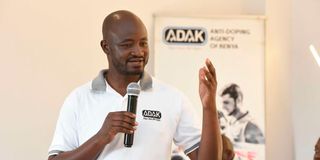ADAK hails Sh185m budget reinstatement

Martin Yauma, from Anti-Doping Agency of Kenya-Head of Education and Research speaks during the Anti-Doping Agency of Kenya/Athletics Kenya seminar in Eldoret in November 2022.
What you need to know:
- According to ADAK’s Head of Legal, Bildad Rogoncho, 27 new anti-doping cases have been reported since the beginning of the 2024–2025 financial year, with 14 cases recorded in the current calendar year.
- Wahome added that the agency is actively prosecuting violations related to missed tests and conducting intelligence-led investigations.
The Anti-Doping Agency of Kenya (ADAK) has welcomed the reinstatement of its national budget allocation to Sh185 million for the 2024–2025 financial year.
The restoration comes after a drastic reduction that had threatened the agency’s core operations and compliance with international anti-doping standards.
ADAK called the government’s decision a crucial step toward maintaining the integrity of Kenyan sport and fulfilling global anti-doping obligations.
“This reinstated budget is not just financial, but a reaffirmation of Kenya’s commitment to clean sport,” said Bishop Joseph Kagunda, Chairman of ADAK, at a press conference in Nairobi on Tuesday.
He praised President William Ruto for his continued support, as well as the Ministry of Youth Affairs, the Parliamentary Committee on Sports and Culture, and the National Treasury for their role in securing ADAK’s sustainability.
Kagunda revealed that ADAK’s initial 2024–2025 budget had been slashed to Sh20 million, severely jeopardising the agency’s ability to function and drawing concern from the World Anti-Doping Agency (WADA).
WADA responded with collective action following recent audits.
However, sustained lobbying and multi-agency cooperation helped reverse the cuts.
“The budget increase to Sh185 million has revived ADAK’s core functions, including testing, education, and intelligence gathering,” Kagunda said.
Acting CEO Peninah Wahome echoed his sentiments, emphasising that the restored funds had allowed ADAK to re-engage stakeholders and resume its full mandate. “The lack of funding earlier had only spared athletics,” she noted.
Under the Enhanced Anti-Doping Project, ADAK has collaborated with the Athletics Integrity Unit and Athletics Kenya to strengthen four operational pillars: testing, education, intelligence, and investigations.
“Our education and outreach programs remain foundational,” Wahome emphasized. These efforts include school initiatives, training for teachers and coaches, and collaboration with the Kenya Institute of Curriculum Development to embed anti-doping content in the national curriculum.
To deepen grassroots engagement, ADAK is creating a nationwide network of anti-doping ambassadors drawn from local communities and former athletes.
Wahome stressed the importance of involving sports federations in these initiatives. A recent two-day workshop brought representatives from national federations on board.
In 2023–2024, ADAK conducted 4,161 tests—well surpassing its target of 3,500. Wahome said the agency aims to exceed that figure again this year, especially with preparations underway for the 2025 World Athletics Championships in Tokyo.
Dr Martin Yauma, ADAK’s Head of Education and Research, said the agency’s athletics testing pool includes about 270 athletes, with more than 400 others identified on a "probables" list.
“We received a list of 145 athletes from Athletics Kenya. By May 24 this year, over 120 athletes had undergone their first required test. The remaining 20 were unreachable due to insufficient whereabouts data,” he said. ADAK is now advancing to second and third testing phases ahead of national trials.
Yauma added that ADAK is improving test result turnaround times through coordination with WADA-accredited laboratories.
“We want only clean athletes at trials and representing Kenya,” he said, emphasising that all testing is based strictly on established criteria, not external pressure from managers or coaches.
In terms of enforcement, ADAK continues to work with local and international partners to prosecute doping violations. Wahome noted that common infractions include the presence of banned substances, refusal to test, tampering, and whereabouts failures.
ADAK has enhanced its internal intelligence and investigative capacity and is working closely with law enforcement to dismantle doping networks.
“We hosted a strategic meeting with law enforcement bodies to seal loopholes in our enforcement structure,” Wahome said. She also reaffirmed ADAK’s opposition to Enhanced Games—events that allow performance-enhancing drugs. “Such initiatives undermine decades of global anti-doping work and endanger the health and integrity of sport,” she stated.
Wahome called on all stakeholders—including athletes, coaches, federations, schools, sponsors, and the media—to support the clean sport agenda. “We appreciate the media’s ongoing support in amplifying our message,” she said.
She noted that during the funding shortfall, ADAK’s work in non-athletics disciplines was heavily impacted. “WADA raised concerns during their audit that other sports were not being adequately covered,” she said. The renewed funding will now enable ADAK to engage all federations and implement a more inclusive anti-doping strategy.
Wahome further emphasised the importance of working with individuals who interact closely with athletes, such as community leaders and retired sports figures, to drive the anti-doping message deeper into sports communities.
According to ADAK’s Head of Legal, Bildad Rogoncho, 27 new anti-doping cases have been reported since the beginning of the 2024–2025 financial year, with 14 cases recorded in the current calendar year.
Wahome added that the agency is actively prosecuting violations related to missed tests and conducting intelligence-led investigations.
Although some athletes could not be reached, Yauma said the agency made considerable efforts to contact them. “Efforts to contact and test the remaining 20 athletes included calls, messages, and invitations to events,” he said. Those athletes will now be ineligible to compete in the upcoming World Championships.


